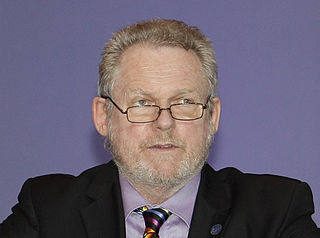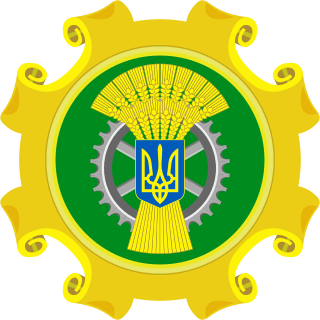The Ministry of International Trade and Industry was a ministry of the Government of Japan from 1949 to 2001. The MITI was one of the most powerful government agencies in Japan and, at the height of its influence, effectively ran much of Japanese industrial policy, funding research and directing investment. In 2001, MITI was merged with other agencies during the Central Government Reform to form the newly created Ministry of Economy, Trade and Industry (METI).

The minister of innovation, science, and industry is the minister of the Crown in the Canadian Cabinet who is responsible for overseeing the economic development and corporate affairs department of the government of Canada; Innovation, Science and Economic Development Canada.
A Commerce minister is a position in many governments that is responsible for regulating external trade and promoting economic growth. In many countries, this role is separate from a finance minister, who has more budgetary responsibilities.
The Cabinet of Malaysia is the executive branch of the Government of Malaysia. Led by the Prime Minister, the cabinet is a council of ministers who are accountable collectively to the Parliament. According to the Article 43 of the Federal Constitution, members of the Cabinet can only be selected from members of either houses of Parliament. Formally, the Yang di-Pertuan Agong appoints all Ministers on the advice of the Prime Minister. The constitution is amended by repealing the Clause (8) of Article 43, enabling a person who is a member of State Legislative Assembly to continue to serve even while serving as a minister or deputy minister in the cabinet. Ministers other than the Prime Minister shall hold office during the pleasure of the Yang di-Pertuan Agong, unless the appointment of any Minister shall have been revoked by the Yang di-Pertuan Agong on the advice of the Prime Minister but any Minister may resign from office. In practice, the Yang di-Pertuan Agong is obliged to follow the advice of the Prime Minister on the appointment and dismissal of ministers.

The Ministry of Trade, Industry and Energy is a ministry under the Government of South Korea. It is concerned with regulating economic policy, especially with regard to the industrial and energy sectors. The ministry also works to encourage foreign investment in Korea.

The Ministry of Economy, Trade and Industry, METI for short, is a ministry of the Government of Japan. It was created by the 2001 Central Government Reform when the Ministry of International Trade and Industry (MITI) merged with agencies from other ministries related to economic activities, such as the Economic Planning Agency.

The Ministry of Commerce and Industry administers two departments, the Department of Commerce and the Department for Promotion of Industry & Internal Trade. The head of the Ministry is a Minister of Cabinet rank.
The Ministry of Trade and Industry is a ministry of the Government of Singapore responsible for the formulation and implementation of policies related to the development of business, trade and industry in Singapore.

The Ministry of Enterprises and Made in Italy, commonly known under the shortening of its pre-2022 name, MISE, is a government ministry of the Italian Republic. It deals with production, economic activities, energy and mineral resources, telecommunications, consumers, tourism, internationalisation and business incentives. It was formed in 2006 after the reorganization of the Ministry of Productive Activities to which were merged the Ministry of Communications and the Ministry of International Trade in 2008.

Ebrahim Patel is a South African politician and former trade unionist who served as the Minister of Trade, Industry and Competition from May 2019 to July 2024. He previously served as Minister of Economic Development from 2009 to 2019.

Robert Haydn Davies was minister of trade and industry of South Africa from 2009 to 2019.

The Department of Trade, Industry and Competition (DTIC) has a mandate to develop the South African economy. They envision a dynamic, industrial and globally competitive economy, that is inclusive, offers decent employment and equity.Previously known as the Department of Trade and Industry this department, within the South African government, is responsible for commercial policy and industrial policy. The dtic and its subsidiary agencies are involved in promoting economic development, Black Economic Empowerment, implementing commercial law, promoting and regulating international trade, and consumer protection.

The Ministry of Economic Affairs is the Netherlands' ministry responsible for international trade, commercial, industrial, investment, technology, space policy, as well as tourism.
Government ministries in Ukraine are the central bodies that are entrusted to implement a state policies in a certain field of government. Each ministry is governed by a respective minister. The collective of ministries is called the Cabinet of Ministers of Ukraine. The modern Ukrainian ministries were first established after the February Revolution of 1917 when the Russian Emperor was forced to abdicate. The first ministries (secretariats) were Secretariat of state, Finance, Justice, Labor, Education, Communication, Trade and Industry, Transportation, Military, Agriculture, and Office of General Secretariat.

The Ministry of Agrarian Policy and Food is the central executive authority of Ukraine in charge of country's agro-development. It is one of the oldest government agencies of Ukraine. On 29 August 2019 the ministry's function were taken over by the Ministry of Economic Development, Trade and Agriculture. On 17 December 2020 the ministry was resurrected.
The Ministry of Industrial Policy of Ukraine is a former government ministry of Ukraine; it was the main body in the system of central bodies of the executive power. It was created from the former Ministry of Economy and initially was created as Ministry of Machinebuilding, Military-Industrial Complex and Conversion in 1996 and merged with the Ministry of Economic Development and Trade in March 2014 with headquarters in Kyiv.

The minister of economic development is a minister in the Cabinet of South Africa. Effective from 29 May 2019, the Ministry of Economic Development has been amalgamated with the Ministry of Trade and Industry to form the Ministry of Trade, Industry and Competition.
The state agencies that form Thailand's public sector consist of several types of functioning bodies. While some agencies established by mandate of the constitution are independent, others are directly or indirectly answerable to the executive of the Royal Thai Government. The majority of these are government agencies, which employ the civil service as well as the military. Others include public organizations and state enterprises.



















